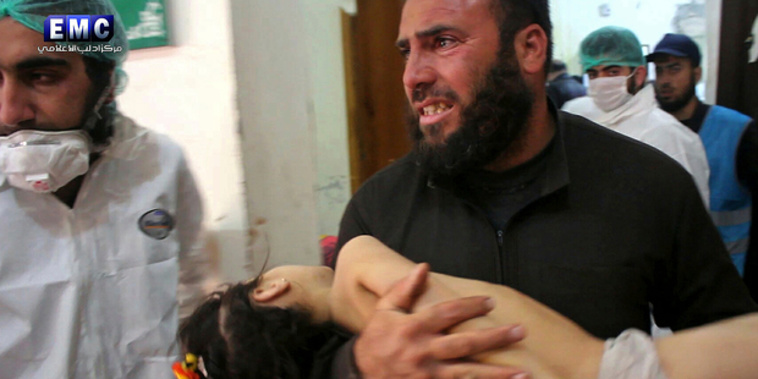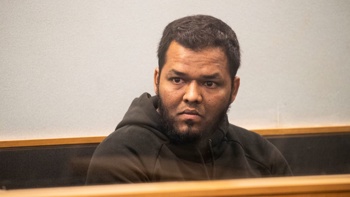
UPDATED 7.57AM A suspected Syrian government chemical attack has killed scores of people, including children, in the northwestern province of Idlib.
The Syrian military denied responsibility for Tuesday's attack and said it would never use chemical weapons.
The US government believes the chemical agent sarin was used in the attack that was "almost certainly" carried out by forces loyal President Bashar al-Assad, a US government source tole Reuters.
The head of the health authority in rebel-held Idlib said more than 50 people had been killed and 300 wounded. The Union of Medical Care Organizations, a coalition of international aid agencies funding hospitals, said at least 100 people had died.
The Syrian Observatory for Human Rights put the toll at 58 and believed it was carried out by Syrian jets.
The Russian Defence Ministry said its aircraft had not carried out the attack. The UN Security Council was expected to meet on Wednesday to discuss the incident.
Reuters photographs showed people breathing through oxygen masks and wearing protection suits, while others carried the bodies of dead children, and corpses wrapped in blankets lined up on the ground.
Mounzer Khalil, head of Idlib's health authority, said hospitals in the province were overflowing with victims.
Warplanes later struck near a medical point where victims of the attack were receiving treatment, the Observatory and civil defence workers said.
The incident reported at Khan Sheikhoun would be the deadliest chemical attack in Syria since sarin gas killed hundreds of civilians in Ghouta near Damascus in August 2013. Western states said the Syrian government was responsible for that attack. Damascus blamed rebels.
The White House called the attack an "intolerable act" and said President Donald Trump was alarmed by the reports. French President Francois Hollande directly blamed Syrian government forces and said Assad's allies were emboldening him to act with impunity.
Assad has enjoyed staunch military backing from Iran and Russia in the war.
Britain said he would be guilty of a war crime if it were proved his regime was responsible. The UN envoy for Syria said the "horrific" chemical attack had come from the air.
A series of investigations by the United Nations and the Organisation for the Prohibition of Chemical Weapons (OPCW) found that various parties in the Syrian war had used chlorine, sulphur mustard gas and sarin.
Turkey, which backs the anti-Assad opposition, said the attack could derail Russian-backed diplomatic efforts to shore up a ceasefire.
Idlib province contains the largest populated area controlled by anti-Assad rebels - both nationalist Free Syrian Army groups and powerful Islamist factions including the former al-Qaeda-linked Nusra Front.
Following the 2013 attack, Syria joined the international Chemical Weapons Convention under a US-Russian deal, averting the threat of US-led military intervention.
Under the deal, Syria agreed to give up its toxic arsenal and surrendered 1300 tonnes of toxic weapons and industrial chemicals.
Investigators found, however, that it continued to use chlorine, in the form of barrel bombs.
Take your Radio, Podcasts and Music with you









